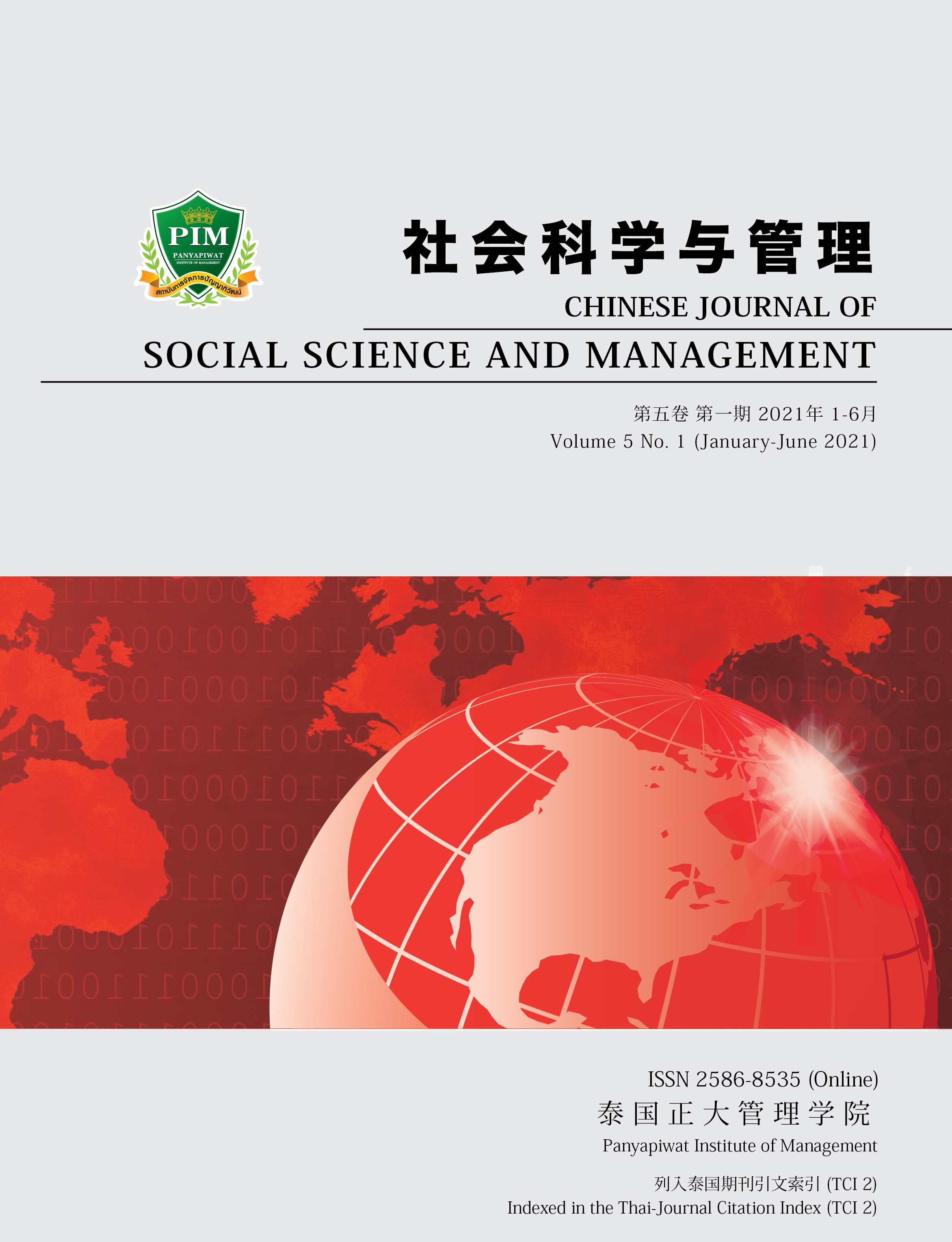THE INFLUENCE OF ABUSIVE SUPERVISION ON MANAGER’S OWN ANXIETY BASED ON THE MEDIATING ROLE OF JOB DEMANDS AND REGULATORY ROLE OF EMOTIONAL INTELLIGENCE
Main Article Content
Abstract
Based on the social comparison theory and moral cleansing perspective, and from the perspective of supervisors, this study explores the negative impact of abusive supervision by supervisors on their own. The results show that abusive supervision has a significantly positive impact on managers’ self-anxiety level. The perceived job demands of managers have a mediating effect between abusive supervision and managers’ own anxiety level. Emotional intelligence plays a negative regulatory role between abusive supervision and managers’ perceived job demands. Managers with high emotional intelligence can weaken the influence of abusive supervision on their perception of job demands, and vice versa. Emotional intelligence has a moderating effect on the mediating effect between abusive supervision and managers’ anxiety level. Managers with high emotional intelligence can weaken the mediating effect between abusive supervision and managers’ own anxiety level, and vice versa.
Article Details
Chinese Journal of Social Science and Management Editorial Division
The Office of Research and Development, Panyapiwat Institute of Management
85/1 Moo 2, Chaengwattana Rd., Bang Talat, Pakkred, Nonthaburi 11120, Thailand
Tel. 02 855 01048 E-mail: cjssm@pim.ac.th
References
Antony, M. M., Bieling, P. J., Cox, B. J., Enns, M. W., & Swinson, R. P. (1998). Psychometric Properties of the 42-Item and 21-Item Versions of the Depression Anxiety Stress Scales in Clinical Groups and a Community Sample. Psychological Assessment, 10(2), 176-181.
Bingdoulinglong. (2010). Many Employees Jumped Off the Building One after Another Because of the Heavy Pressure from Foxconn. Retrieved June 15, 2019, from http://www.xilu.com/zhuanti/my _3414/
Burris, E. R., Detert, J. R., & Chiaburud, D. S. (2008). Quitting Before Leaving: The Mediating Effects of Psychological Attachment and Detachment on Voice. Journal of Applied Psychology, 93(4), 912-922.
Derogatis, L. R., & Unger, R. (2010). Symptom Checklist-90-Revised: John Wiley & Sons, Inc. Retrieved June 15, 2019, from https://onlinelibrary.wiley.com/doi/abs/10.1002/9780470479216.corpsy09 70
Farh, C. I. C., & Chen, Z. (2014). Beyond the Individual Victim: Multilevel Consequences of Abusive Supervision in Teams. Journal of Applied Psychology, 99, 1074-1095.
Harris, K. J., Kacmar, K. M., & Zivnuska, S. (2007). An Investigation of Abusive Supervision as a Predictor of Performance and the Meaning of Work as a Moderator of the Relationship. The Leadership Quarterly, 18(3), 252-263.
Henry, J. D., & Crawford, J. R. (2005). The Short-Form Version of the Depression Anxiety Stress Scales (DASS-21): Construct Validity and Normative Data in a Large Non-Clinical Sample. British Journal of Clinical Psychology, 44, 227-239.
Hooijberg, R., Hunt, J. G., & Dodge, G. E. (1997). Leadership Complexity and Development of the Leaderplex Model. Journal of Management, 23(3), 375-408.
Karasek, R. A. (1979). Job Demands, Job Decision Latitude, and Mental Strain-Implications for Job Redesign. Administrative Science Quarterly, 24(2), 285-308.
Lanaj, K., Johnson, R. E., & Lee, S. M. (2016). Benefits of Transformational Behaviors for Leaders: A Daily Investigation of Leader Behaviors and Need Fulfillment. Journal of Applied Psychology, 101(2), 237-251.
Law, K. S., Wong, C. S., & Song, L. J. (2004). The Construct and Criterion Validity of Emotional Intelligence and Its Potential Utility for Management Studies. Journal of Applied Psychology, 89(3), 483-496.
Lin, S. H. J., Ma, J., & Johnson, R. E. (2016). When Ethical Leader Behavior Breaks Bad: How Ethical Leader Behavior Can Turn Abusive Via Ego Depletion and Moral Licensing. Journal of Applied Psychology, 101(6), 815-830.
Martinko, M. J., Harvey, P., Brees, J. R., & Mackey, J. (2013). A Review of Abusive Supervision Research. Journal of Organizational Behavior, 34(S1), S120-S137.
Priesemuth, M., Schminke, M., Ambrose, M. L., & Folger, R. (2014). Abusive Supervision Climate: A Multiple-Mediation Model of Its Impact on Group Outcomes. Academy of Management Journal, 57(5), 1513-1534.
Qin, X., Huang, M. P., Johnson, R. E., Hu, Q. J., & Ju, D. (2018). The Short-Lived Benefits of Abusive Supervisory Behavior for Actors: An Investigation of Recovery and Work Engagement. Academy of Management Journal, 61(5), 1951-1975.
Salovey, P., & Mayer, J. D. (1990). Emotional Intelligence. Imagination, Cognition and Personality. 9(3), 185-211.
Sun, J., Wang, M., & Wang, Z. (2013). The Influence of Abusive Management on Subordinates’ Performance and Turnover Intention: The Role of Leaders and Power Distance. Journal of Business Economics, 3, 45-53. [in Chinese]
Tepper, B. J. (2000). Consequences of Abusive Supervision. Academy of Management Journal, 43(2), 178-190.
Tepper, B. J. (2007). Abusive Supervision in Work Organizations: Review, Synthesis, and Research Agenda. Journal of Management, 33, 261-289.
Tetlock, P. E., Kristel, O. V., Elson, S. B., Green, M. C., & Lerner, J. S. (2000). The Psychology of the Unthinkable: Taboo Trade-Offs, Forbidden Base Rates, and Heretical Counterfactuals. Journal of Personality and Social Psychology, 78, 853-870.
Wu, W., Wang, W., & Liu, J. (2012). Abusive Supervision, Psychological Security Perception and Employee Voice Behavior. Journal of Management, 1, 57-63. [in Chinese]
Xi’an Evening News community life. (2018). 29 year old doctor of Xi’an Jiaotong University committed suicide. Retrieved June 15, 2019, from https://www.sohu.com/a/2176490 37_348931
Zhang, Y., & Bednall, T. C. (2015). Antecedents of Abusive Supervision: A Meta-Analytic Review. Journal of Business Ethics, 139(3), 455-471.


